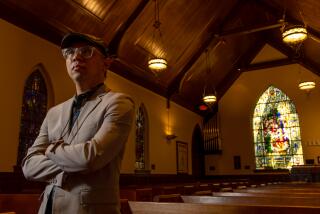For One Ethnic Chinese Shop Owner, It’s Time to Start Again
- Share via
JAKARTA, Indonesia — In the hands of a Hollywood screenwriter, this story might have had a happier ending.
It has been a week since an angry mob sent Petrus Tjihaja’s two small embroidery shops up in flames. Heavy metal doors kept out the people but not the fire. Over a matter of hours, Tjihaja watched 40 years of hard work destroyed.
All that was left were a spongy carpet of charred thread, some indistinguishable piles of melted plastic and metal, and a large safe. Perhaps the safe had protected his cash, two days’ worth of receipts, and some personal items.
On Friday, a crew of locksmiths was brought in to help open the heavy safe door, which had been fused shut by the heat of the fire. Tjihaja, his wife and son stood in the center of the burned-out building and watched as the door was pried loose.
The locksmith shook his head sadly. The 60-year-old shop owner reached down into the safe and pulled out a handful of charred bills. They crumpled in his hand. He reached down again and pulled out a couple of thin gold bracelets.
“I thought there would be something more left,” he said quietly, allowing himself a brief moment of emotion.
The Tjihaja family lost 3 billion rupiah--about $270,000, based on Friday’s exchange rate--worth of property during what is now known in Indonesia’s Chinese community as “Black Thursday.” The insurance company has refused to cover the damage, saying the premium did not cover riots.
On an intellectual level, Petrus Tjihaja understands why he was the target of such anonymous hatred. He is an ethnic Chinese Christian in a land of Muslims. He lived well in a poor country where putting food on the table has gotten even harder in recent months. His attackers were mostly young and poor.
But Tjihaja tries not to think too much about the combustible mixture of race and class that led to his misfortune. He doesn’t feel he can leave Indonesia, his family’s home for three generations. His business and his longtime customers are here.
For a few long moments, Tjihaja searches for something to be grateful for. Then he remembers. At least 500 Indonesians and Chinese died in last week’s violence, most of them trapped in burning buildings. He and his family are still alive.
“I must start again,” he said. “I must start again; otherwise, how can I survive?”
More to Read
Sign up for Essential California
The most important California stories and recommendations in your inbox every morning.
You may occasionally receive promotional content from the Los Angeles Times.













